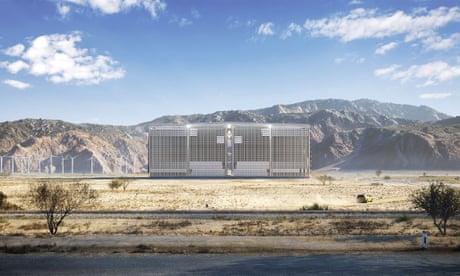- by foxnews
- 08 Apr 2025
New battery technology could be a ‘game changer’ for regional Australian communities
New battery technology could be a ‘game changer’ for regional Australian communities
- by theguardian
- 18 Nov 2022
- in news

The head of a Swiss energy company which has plans to build a large storage battery in Townsville says its technology will be a "game changer" for rural communities because it can be built anywhere - provided the locals don't mind having a structure that is as tall as a 20-storey building.
Energy Vault has pioneered a gravity energy storage system that uses surplus energy to raise 35-tonne blocks, made out of recycled materials, to the top of the tall battery structure. Energy is released by lowering those blocks.
The Townsville proposal, a deal struck with Korea Zinc-owned Sun Metals to build a gravity energy storage system to power its zinc refinery in north Queensland, would be the first use of the technology in Australia.
It was also awarded a contract last month to develop a 250MW/500MWh conventional battery alongside the proposed 350MW Meadow Creek solar farm near Wangaratta in north-east Victoria.
The Energy Vault CEO, Robert Piconi, told Guardian Australia the gravity energy storage system technology works in the same way as pumped hydro, in that it uses gravity to create kinetic energy.
"What we did was mirror gravity but solved to make something where you didn't need any mountains or rivers and do not need to disrupt wildlife ecosystems," Piconi said.
"We can build it anywhere you can build a 20-storey building."
Piconi said Australia was an area of focus for Energy Vault due to the rapid proliferation of renewables and the large number of power-hungry industrial and commercial clients. He said it could support new heavy industry developments in rural and regional areas because the technology is not tied to access to any particular raw materials.
He said it would also create construction jobs in those areas.
"We estimate that 60-80% of the dollars you spend in [building] storage goes back into the local community," he said.
Piconi said gravity storage allowed power to be stored for a longer duration, which made it a more attractive option for energy-intensive industries that needed more than the two to four hours of storage usually provided by lithium ion batteries. He added that the lack of reliance on particular elements, like lithium, made it a more sustainable solution.
Andrew Fraser from the Australian National University's battery storage and grid integration program said the technology looked "very promising", but he said investors may need more convincing.
"When alternative technologies start to come in, they certainly can show a lot of promise, but they generally come with a lot of risk," Fraser said.
"We saw this a little bit with solar, probably around 10 years ago, when there were a few pilot projects around for things like thermal solar storage, and even geothermal investments. Some projects started to develop towards a pilot but the money quickly started to evaporate because the solar, just very basic PV solar, was so much less risky at a large scale."
Fraser said Australia was "the canary in the coalmine for the renewable energy future", which made it an attractive place for international companies to pilot energy projects.
The University of Tasmania energy expert Prof Xiaolin Wang said any technology that could solve lithium batteries' "pollution problems" was welcome. But he added that uptake ultimately depended on the technology being able to make it cost-effective and efficient.
Energy Vault's backers include Korea Zinc, BHP and Saudi Aramco. Piconi acknowledged the company could face some criticism for being backed by polluters but said his focus was on tackling the climate crisis, a challenge that he said required all parties to work together.
"They [Energy Vault's backers] see the need to make the transition," Piconi said. "I don't think about it as washing their hands, I think they've understood that things have to change."
In Wangaratta, about 20 minutes from where the conventional Meadow Creek battery will be built, the deputy mayor, Harry Bussell, said the community had yet to see how it would benefit from the expansion of renewable technologies. He also raised concerns about the safety of the solar farm and battery in the event of a bushfire.
Ultimately he said he would wait until the project had broken ground to judge.
"There's a long list of solar farms has been approved in Victoria, but there's a very short list of actual solar farms," Bussell said.
- by foxnews
- descember 09, 2016
Ancient settlement reveals remains of 1,800-year-old dog, baffling experts: 'Preserved quite well'
Archaeologists have recently unearthed the remarkably well-preserved remains of a dog from ancient Rome, shedding light on the widespread practice of ritual sacrifice in antiquity.
read more


